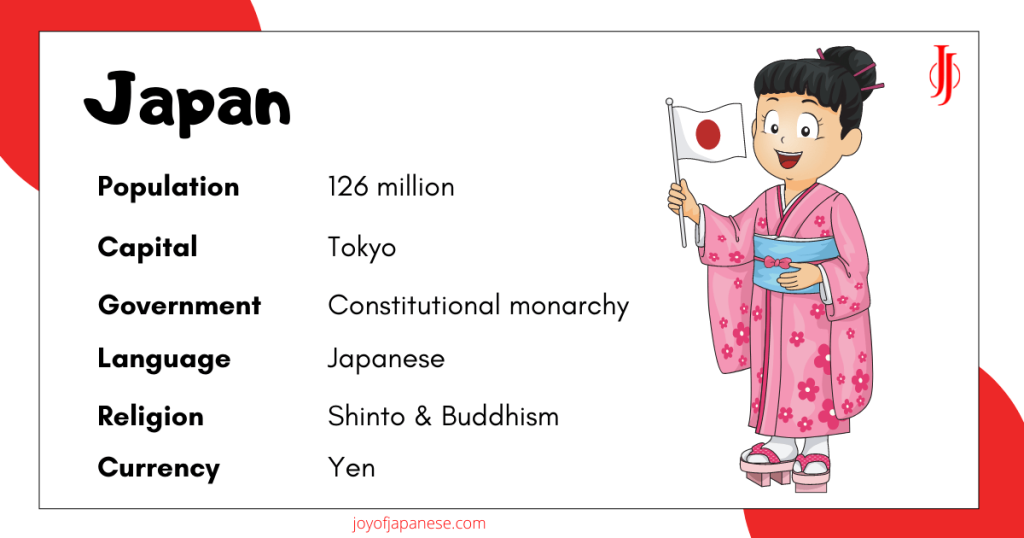There are many good reasons to learn Japanese, but many people fear taking the plunge. Don’t let the hiragana, Katakana, and kanji scare you! Please read this article to find out why you should study it.
Learning a language is always a good option. It is fun and challenging, and it can give you a fresh perspective on your thinking and ideology, opening a portal into another world.
It is also said that learning a new language can sharpen memory and improve cognitive thinking. And in the most obvious way, it helps with improving communication skills.
As an extra advantage, it can make a good impression on others, making the learner bright and fascinating.
Given the benefits of language learning, learning Japanese can be even more worthwhile. It is a new journey with assured positive outcomes.
TABLE OF CONTENTS
- 16 Top Benefits of Learning Japanese in 2025
- 1. You can communicate with over 125 million speakers
- 2. For the love of Japanese food
- 3. Japanese helps us learn other East Asia languages
- 4. Good for memory and health benefits
- 5. A gateway to an incomparable cultural universe
- 6. Increased career prospects
- 7. Job opportunities in Japanese companies
- 8. Japanese will set you apart from the crowd
- 9. Personal growth
- 10. The international spread of the language
- 11. Teach English in Japan
- 12. Higher study in Japan
- 13. You want to visit Japan at least once
- 14. Improves networking
- 15. Open yourself up to new music and entertainment
- 16. Japan is the language of inventors and innovators
- Wrapping Up: Should You Learn Japanese?
16 Top Benefits of Learning Japanese in 2025
Japan is a developed and beautiful country with much to offer in terms of culture, career, entertainment, and lifestyle.
Need some motivation and inspiration to learn Japanese? You’ve come to the right place.
Here, I will share the 16 most promising advantages of learning the Japanese language. So, let’s get the ball rolling!

1. You can communicate with over 125 million speakers
According to the 2024 Ethnologue research, over 125 million people speak Japanese as their first language. This makes Japanese the 9th most spoken native language in the world.
Considering there are currently 7,151 languages spoken around the globe, that’s pretty high on the list.
Japan is the only country where Japanese is the official language. So, nearly 99% of native speakers live in Japan.
There are sizeable Japanese diasporas in Brazil, Canada, the US, China, the Philippines, and many others. In addition, around 5 million people speak Japanese with some proficiency outside of Japan.
Learning Japanese allows you to communicate with 130 million more people and connect more deeply. Also, since it is widely taught, you will talk to many learners across the globe.
OK, you might think, that’s just a number. You could apply it to any famous language. But why would anyone want to engage with Japanese speakers in particular?
First, Japan is a developed and technologically advanced country with many giant companies. Second, it has a rich history, beautiful places, and colorful culture.
Japanese people are also some of the most friendly and nice people.
Learning Japanese gives you access to a lovely and exciting group of individuals.
You can chat with them about any never-ending intriguing topic, from Karaoke and Sushi to Origami and Samurai to Sudoku and Manga.
2. For the love of Japanese food
Is there anyone who does not enjoy delicious food?
Japanese cuisine is famous worldwide, and the reasons for this are clear. It is unique, delightful, nutritious, and fresh and contains healthy and tasty food items. Also, the presentation is always outstanding.
Sushi, a traditional Japanese dish, is a delicacy enjoyed worldwide.
Samen, Ramen, Tempura, Kare-Raisu, Sushi, Okonomiyaki, Miso Soup, Yakitori, Shabu Shabu, Onigiri, and Udon are hearty and tasty reasons for learning Japanese.
Are you a diehard fan of mouth-watering foods? If so, knowing the original language is beneficial for enjoying them thoroughly. You don’t need to be fluent, but a basic understanding will go a long way!
The dishes, recipes, ingredients, and food-related vocabulary and phrases help you learn new things about the language. You also know a lot about Japan and its culture through Japanese cuisine.

3. Japanese helps us learn other East Asia languages
Most East Asia languages, like Korean, Chinese, Japanese, Mongolian, Thai, Bahasa, Vietnamese, etc., are distinct. This is because they all belong to families with different languages.
Still, some of these languages share similar features because of their geographical closeness, social context, and historical context.
For example, Korean and Japanese grammar is identical to some extent. Honorific terminology is prevalent in both languages to show respect. They also share many vocabulary, SOV, and sentence structure rules, and both use markers.
Likewise, the Japanese use the Kanji writing system derived from Chinese characters. By doing so, you will take a step closer and get the benefit of learning Chinese.
Many words are also derivative or alike between Japanese and Mandarin or Korean. This would provide a solid basis for further exploration of the language paradigm.
To sum up, once you achieve reasonable fluency in Japanese, you can have an advantage in studying Korean or Chinese.
There is a difference in the written characters since Koreans use Hangul while the Japanese use Kanji (Chinese Hanja). Yet, Japanese differs from Chinese in speech sounds, tones, and native words.
Based on my interactions with experts in these languages, I concluded that Mandarin, Japanese, and Korean share roughly 20%. This is not much, but it is better than having nothing in common.
4. Good for memory and health benefits
Learning a new language engages the brain in many ways and helps to increase brainpower.
For example, studies prove that bilingual or multilingual people are better at critical and analytical thinking. This means learning Japanese can make people more competent and more analytical.
Japanese is a complex language. And that’s why many studies suggest that learning Japanese uses more brain parts than other languages. This increases your mental abilities and memory.
Bilingualism can make you brighter, more focused, and capable of prioritizing and multitasking. To put it simply, it enhances your cognitive skills.
A distinctive feature of the Japanese language is the variety of strokes, writing styles, and methods. That helps make it a more valuable tool for exercising the mind.
You can challenge yourself more with a unique and tricky language like Japanese. This will surely keep your brain active for good.
This is why knowing a language like Japanese makes your brain sharper, more innovative, and healthier.
5. A gateway to an incomparable cultural universe
Language learning isn’t just about the alphabet, vocabulary, and grammar rules. This would also include the rich culture rooted deep within it.
Understanding the culture and language together makes experiences even better. This is because they elevate each other and act as catalysts. This makes learning Japanese a new, adventurous, and other-worldly experience.
Japan has a legendary history and an intricate culture reflected in its language phrases, idioms, slang, and dialects.

Japanese culture is unique and a perfect mixture of tradition and modernity. The ability to speak Japanese opens a window into one of the world’s most fascinating, multicolored, and ancient civilizations.
Studying Japanese would also require some immersion into the culture to understand the tradition and development of the language.
This means that, as with any new culture, learners will learn and explore Japanese customs, almost experiencing a parallel universe.
6. Increased career prospects
This would probably be the most prominent reason for learning Japanese.
You may have a better chance of getting hired if you know a second language. This will also allow you to negotiate higher salaries. Thus, speaking Japanese is valuable for your career.
Various careers are available in many industries. These include automobiles, semiconductors, animation, consumer electronics, copper, iron and steel, manufacturing, construction, shipbuilding, computers, optical media, R&D, fishing, finance, entertainment, and many more.
Translators and interpreters are the two most meaningful opportunities. You can work for companies dealing with international clients; thus, they are heavily sought after in Japan and worldwide.
You can be a teacher, tour guide, customer executive, marketing sales, and content writer with a good understanding of Japanese. Plus, you can find employment in the vast tourism, hotel, and leisure businesses.
These provide excellent career scope in Japanese. So, having this on your CV is always an asset when you try to get a job in these sectors.
7. Job opportunities in Japanese companies
With the global market expanding and globalization, many Japanese companies have set up corporate or local offices in different countries. They are doing this to grow their business and build skills.
Japan is known for its high-level technology and hyper-productive work culture. As a result, multiple players have established offices and branches worldwide.
Although the local language would be the contact medium, Japanese can give an edge in recruitment.
It would also increase growth opportunities, as the communication gap between the headquarters and the branch office would be reduced.
Further, it expands career prospects in the Japanese economy and the job market. It opens up jobs on an international scale by giving the learner an excellent chance to be hired by Japanese companies and firms.
8. Japanese will set you apart from the crowd
When learning a new language, most people prefer to choose a European language, such as French, Spanish, Italian, or German.
Only a few select a language, such as Japanese. But this isn’t because it’s uncommon. Instead, it’s because it’s difficult and not widely spoken.

Even though it is a recognized language, Japanese is not extensively taught globally. As a result, there is a lack of widespread Japanese language education and resources.
When you learn a less-famous language like Japanese, you will have something rewarding to add to your resume. You can take Japanese tests like the JLPT or NAT test to add more value to your CV.
Proficiency in Japanese would set the learner apart from the other multilingual crowd. This is because there would not be as many of them as those speaking other commonly taught languages around the globe.
This would mean that a person learning Japanese would be a much sought-after language-related role in the job market, thus boosting opportunities.
To elaborate more on the previous notion, a Japanese-speaking person is resourceful internationally. However, an English speaker who can speak Japanese would also be pretty valuable in Japan.
You have access to a whole new world and can become an asset in your personal and professional life. Plus, it will differentiate you from the crowd since very few speak well, at least with higher fluency.
9. Personal growth
The Japanese language can make you a better listener and thinker and help you express your ideas clearly and creatively. It will also give you a broader, more global, parallel, or opposite perspective.
For example, the Japanese language could differ from the learner’s native or native English, making the learner sensitive to and accepting others’ views.
This would be a milestone to add to one’s personal values and growth.
Learning a new language also requires time and discipline. It is a tedious task that requires an exemplary time commitment. Therefore, learning Japanese will inculcate a sense of discipline in the learner.
It will be a productive use of time and help the learner to spend their time more productively. Also, being multilingual improves a person’s ability to multitask.
It enables one to think in many languages and helps in better decision-making. Learning a new language also improves the learner’s native language and helps them better understand their culture and language.
Finally, it also gives the learners a sense of accomplishment for learning a new language and probably even ace it.
Learning Japanese could be a great addition to personal growth and value.
10. The international spread of the language
Japan is the third-largest and one of the biggest economies worldwide, spreading its glory colorfully worldwide. It has affected many countries through trade relations, technological advancements, and exported items.
Japanese technology and products hold a good grip on the global market. As a result, Japanese is an internationally acknowledged and recognized language.
Learning Japanese can be like adding a feather to the hat in the global market as it enables communication with the big Japanese players.
Interacting with them in their language would help you score some brownie points and improve ease and clarity of communication. Plus, it can help in financial markets and will help with easy trading.

11. Teach English in Japan
There are many jobs available for non-native Japanese learners.
For example, working as an ESL (English as a second language) teacher is the most sought-after among foreigners in Japan.
Likewise, there is quite a high demand because of globalization. This includes the need for the English language as a communication tool.
Many Japanese people want to learn English to compete in the international market. Thus, there is always a demand for English teachers in Japan.
They regarded teachers in Japan as elders.
This means you enjoy a special status that allows you to discover valuable and highly unusual cultural traits.
Thus, learning Japanese would be a great stepping stone to boost career opportunities.
12. Higher study in Japan
Japan is noted for its well-researched and developed educational system. Year after year, it invents and manufactures new technologies and goods with precision and distinctiveness.
It also offers over 750 universities, offering a diverse spectrum of disciplines.
According to the Organization for Economic Co-operation and Development, Japan’s education system is high quality, with pupils placing first in mathematics and second in sciences.
Japan is also recognized for producing outstanding academicians, Nobel laureates, and business tycoons, demonstrating the country’s high quality and standard of education.
It also prioritizes vocational education with academics, making it a well-rounded and balanced option. Learning Japanese would be the first step to studying as an international or exchange student in Japan.
It would help you fit in faster, enabling a reasonable exchange of information and a better understanding of academics and other areas. Thus, it is unmissable for those wishing to pursue study at a Japanese educational institution.
13. You want to visit Japan at least once
Japan is a very homogenous country in terms of language and culture. They write everything in Japan naturally, and everyone communicates only in Japanese.
It is rare to find an English signboard or an English-speaking street vendor. As a result, it becomes very tough for a non-Japanese person to navigate or communicate through the city with just English.
Learning the basics before moving to or even visiting the city would be vital. A decent grasp of the local language will always help you feel more welcome and connected to the people. This makes the experience more memorable and fulfilling.

The list of tourist destinations is limitless, including Jigokudani Snow Monkey Park, charming villages, old-age temples, modern Tokyo, sunny beaches in Jodogahama, the incredible mountains of Mount Fuji, and the magical Osaka castle!
Japanese people take great pride in their culture and language, much like any other country. Thus, they would be more drawn to help the learner and make them feel at home if one starts the conversation in their native language.
They would probably even offer to help improve and develop their language skills.
This would greatly help in a new place; thus, studying Japanese could benefit those wanting to move to or visit Japan.
14. Improves networking
Learning Japanese could be very useful in building networks. Opening with a Japanese phrase or idiom suited to the context is always a great conversation starter.
It also promotes the image that the learner is well-accomplished and intelligent. This would boost networking and connectivity with people.
In addition, people would subconsciously perceive someone speaking over one language as approachable and connected to humanity, thus making them seem very approachable.
It helps us feel connected and have extensive networks that immensely contribute to our work and personal lives. It enables ease of communication. Finally, it improves understanding, as each language has features that will enhance it.
Learning Japanese can thus improve communication and connections on networks, making one feel included and part of the international community.
It helps in coming closer to new people, thus making it very beneficial to learn it.
15. Open yourself up to new music and entertainment
Studying a language such as Japanese opens up a new world of exciting and entertaining media.
You can watch movies, TV series, and anime, read literature, comics, and manga, listen to music like J-pop, and play games. And the list of top-quality entertainment content is endless!
J-pop, i.e., Japanese popular music, isn’t just another trendy and modern music. Instead, it is a mesmerizing experience that will take you to something you can only dream of.
Although J-pop may not be as popular as K-pop, it has a huge fan following worldwide. Listening to J-pop can also help you learn Japanese because it uses the casual yet practical language needed to hold conversations.
Japanese movies will open your knowledge and help you learn about rich Japanese culture as part of your language study routine.
The films for Japanese learners allow you to hear and understand how the language is spoken in its natural context. From there, you can figure out what body language is all about.
With Japanese manga and anime taking the internet and video platforms by storm, it can be a fantastic investment of time.
Once you gain at least intermediate-level Japanese skills like JLPT N3, you can watch comics and cartoons to dive deep into the world of J-animation.

16. Japan is the language of inventors and innovators
Besides being geographically isolated, Japan is densely populated and has few natural resources. Despite that, Japan is one of the strongest economies on earth. That is a remarkable achievement by any means.
We know Japan for its top-notch products.
Many Japanese brands, such as Sony, Toshiba, Sanyo, Casio, Canon, Honda, Toyota, Mitsubishi, and many others, have infiltrated the world market because they are committed to creating high-quality products that maintain a global standard.
The Japanese have developed efficient and eco-friendly ways to succeed economically with their creative and scientific ideas.
The government also encourages companies, including SMEs and start-ups, to create new, how-to, and innovative concepts to provide the world with solutions.
Japan’s high-tech companies are leaders in optical media, fermentation, semiconductors, IoT & IA, and industrial robotics.
The Japanese strive for innovation. This has led to many yearly patent applications, making them one of the world leaders in patent filings.
Wrapping Up: Should You Learn Japanese?
Japanese is a beautiful language with nothing but incentives to offer to those willing to learn it.
It is an excellent chance to try newer things and challenge yourself to make a difference. With a bit of time investment and the curiosity to learn, you can reap magnificent benefits after learning Japanese.
These were some of the obvious benefits that I wanted to highlight. But, of course, I know this is just the tip of the iceberg for learning a new language.
Why do you want to learn Japanese, and what excites you most?
I’d like to hear from you. Please share your opinion or any questions you have for me in the comment section below.












I want to learn Japanese to be able to speak to my in-laws and other family members from my wife.